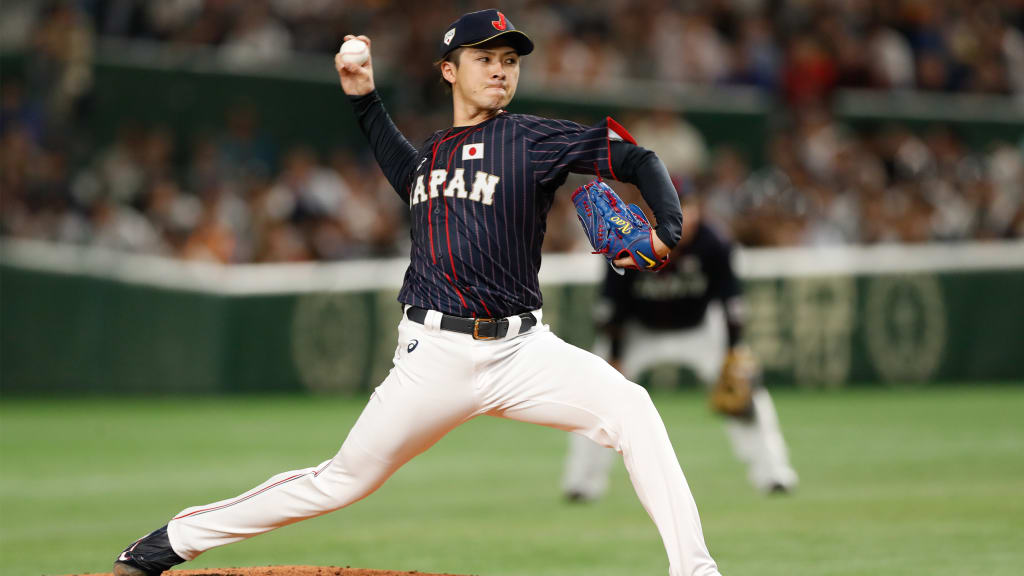
This story was excerpted from Adam Berry’s Rays Beat newsletter. To read the full newsletter, click here. And subscribe to get it regularly in your inbox.
ST. PETERSBURG -- Non-roster deals don’t typically get a lot of headlines in the offseason, but the Rays made a potentially intriguing move last week that could pay dividends this year.
On Jan. 11, Tampa Bay signed right-hander Naoyuki Uwasawa to a Minor League contract with an invitation to Major League Spring Training. Uwasawa was a three-time All-Star in Japan, and he's coming off a career-best season in which he put together a 2.96 ERA over 170 innings for the Nippon Ham Fighters.
Now, there’s a reason why Uwasawa’s posting didn’t generate as much excitement as, say, Yoshinobu Yamamoto or Shōta Imanaga. The soon-to-be 30-year-old doesn’t have elite strikeout stuff, averaging 7.3 per nine innings in his career. He might profile as a back-end starter at best in the Majors, despite producing consistently solid results, including a 3.19 ERA, over nine seasons in Nippon Professional Baseball.
But it’s still an interesting move for the Rays in their pursuit of rotation depth. Here are three reasons why.
1. The Rays need innings. He can provide them
Uwasawa said this to reporters at a press conference in Japan last October, and it must have sounded like music to executives’ ears: “Teams need pitchers that can eat up innings. I can contribute by going many innings without getting an injury.”
Indeed, the right-hander pitched a Pacific League-high 170 innings last year. He worked 160 innings the year before that and 160 1/3 frames in 2021, plus 171 1/3 innings in '18.
Here is a complete list of Rays pitchers who have worked at least 160 innings in any of the past five full seasons: Zach Eflin (177 2/3 last year), Shane McClanahan (166 1/3 in 2022), Corey Kluber (164 in '22), Charlie Morton (194 2/3 in 2019) and Blake Snell (180 2/3 in '18). Only 45 pitchers in the Majors worked at least 160 frames last year.
That need could be even more glaring for the Rays this season.
Eflin and Aaron Civale, both of whom have dealt with injuries in the past, are projected to lead the rotation in the absence of Shane McClanahan (rehabbing from Tommy John surgery) and Tyler Glasnow (traded to the Dodgers in December). Zack Littell will look to continue the challenging transition -- and dramatic increase in workload -- from the bullpen to the rotation. Taj Bradley and Ryan Pepiot are talented but inexperienced.
Additionally, Shane Baz will be limited in his return from Tommy John surgery, and it’s unclear when rehabbing starters Jeffrey Springs and Drew Rasmussen will be ready to take the mound again. Meanwhile, the Rays' best pitching prospects are a few years away.
So, why not see if Uwasawa can back up what he said at that press conference?
2. The price was right
Signing Uwasawa didn’t immediately force the Rays to drop another player to make room on their 40-man roster. If they want to add him, they can do so during Spring Training, as spots become available when McClanahan, Rasmussen and Springs move to the 60-day injured list.
It’s also a relatively low-risk, low-cost acquisition. Uwasawa will receive a $25,000 signing bonus, a source confirmed, and Tampa Bay must pay a fee of $6,250 (one-quarter of his signing bonus) to his former club in Japan. The Rays will also owe the Fighters 15% of Uwasawa's total earnings in the Majors at the end of the year.
If Uwasawa is added to the 40-man roster, his split contract will call for him to make $2.5 million while in the Majors and $225,000 while in the Minors, according to a source. He could earn up to $3.5 million, with the additional $1 million available through performance bonuses based on innings pitched in the Majors. He would receive $100,000 by working 70 innings for the Rays and the same amount for every 10 innings on top of that, with a maximum of $1 million for 160 innings.
Since he can be sent to the Minors, there’s less pressure for Uwasawa to make an adjustment to Major League competition by the end of Spring Training. He can work at Triple-A Durham, if need be, and the Rays could open the season with a rotation of Eflin, Civale, Littell, Bradley and Pepiot, barring any further acquisitions.
3. He wanted to be here
This stood out when the Rays announced the signing with a statement from Uwasawa: “I’m excited to join the Rays’ organization and [I’m] grateful for the opportunity to begin a career in Major League Baseball. I decided to play for the Rays because the success and the rich history of pitching development really intrigued me.”
Uwasawa reportedly passed up guaranteed Major League deals to join the Rays, which says even more than any quote could. Tampa Bay has a remarkable track record with pitchers, using advanced data and simple messages to get the most out of nearly every arm that comes through Tropicana Field, with Littell and Robert Stephenson serving as two recent examples.
Sports Info Solutions put together a nice write-up on Uwasawa in December, explaining his repertoire and what he does well. While Uwasawa doesn’t possess overpowering stuff, there’s enough command and depth to his pitch mix -- plus enough intriguing characteristics with his fastball and splitter, in particular -- to believe the Rays can help him perform at his best and maybe even reach another level.
That’s what he signed up for, after all.


